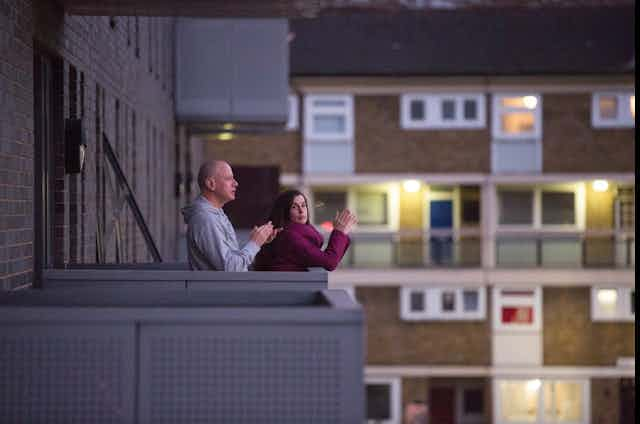As we approach the one-year anniversary of the coronavirus outbreak, it’s evident how profound the worldwide social impact of the pandemic has been. Reports have looked beyond the science to the effects the pandemic has had on individuals, accounts of the impact on everyday life and the ways in which ordinary people have responded to these extraordinary times.
Some of these narratives have become sensations, read and shared and heard across the globe, revealing the lives of people coping in remarkable situations. The story of Tom Moore is one example: the former army captain who at the age of 99 walked 100 laps of his garden to raise money for the NHS.
This simple act ignited an international response that connected his modest private aim of raising £1,000 with those of the wider public, who sought some alternative focus and a beacon of hope during a time of crisis. The result was more than £32 million being raised for the NHS, and Tom Moore being given a knighthood.
In such times we should consider the link between what the American sociologist Charles Wright Mills called “private troubles” and “public issues”. Wright Mills challenged us to explore the aspects of social life that are considered to be individual in relation to the broader structure and organisation of society. We are social creatures, our individual and social lives inextricably interconnected, and Wright Mills encouraged us to consider these links. Today’s focus on individual lives is perhaps even more pertinent given that our social lives under lockdown have become constrained for so long.

Historically, biographies and autobiographies are how lives are recorded. These tended to be only of famous or infamous individuals, although diaries such as those of Samuel Pepys and Anne Frank capture the experience of ordinary people living through significant events.
But there is now greater interest in lives hidden from view, such as those who overcome adverse childhood experiences and eventually triumph: growing up in poverty (Kerry Hudson’s Lowborn), or in care (Lemn Sissay’s My Name is Why), life in a criminal gang (Allan Weaver’s So you Think You Know Me?), or a life sentence in prison (Erwin James’ Redeemable), explorations of race and class (Akala’s Natives), autism (Donna Williams’s Nobody Nowhere) or alcoholism and homelessness (John Healy’s The Grass Arena). These autobiographies recount the individuals’ lives while highlighting the social, cultural and historical context in which they are lived.
Today, diaries are often kept not in the traditional sense but through social media posts and profiles. Our fascination with other lives has grown exponentially with new media that provides greater access to and insights into people’s lives (or versions of them). It’s also seen through the proliferation of celebrity and pseudo-reality programmes such as Made in Chelsea, competitive social experiments such as Love Island, and fly-on-the-wall television documentaries such as Hospital and the Educating… series.
Living through the pandemic
Once the initial shock of the pandemic settled into a “new normal”, attention shifted to the lives of everyday people. This mirrored what happened after 9/11 where, once the enormity of the situation and its implications had sunk in, the experiences of those affected became the focus. Television programmes such as Isolation Stories explored life during lockdown, and documentaries such as Panorama have explored how it has changed us. The rise of mutual help groups is one example of how people have contributed to their local communities.
The circumstances presented us with unexpected heroes, illustrated in the July version of British Vogue that featured a community midwife, a supermarket worker and a train driver on the cover. Editor Edward Enninful said: “I can think of no more appropriate trio of women to represent the millions of people in the UK who in the face of dangers large and small, put on their uniforms and went to help people”.

The isolating nature of lockdown and social distancing and uncertainty over how long it may continue has prompted consideration of how to better understand ourselves as individuals and as a society. There has been growing concern for those surviving the pandemic through poverty, domestic abuse and other combinations of inequalities. We cannot assume we know other people’s experiences of the pandemic, and while we have been constantly reminded that “we are all in this together”, we know in reality that experiences can be very different depending on circumstances.

The government’s requests for us to take responsibility in order to keep others safe, for example through staying at home or wearing masks, has highlighted those who behave appropriately. Outrage has been directed at the irresponsible behaviour of others, from stockpiling toilet rolls and medicines, or spending the day at the beach – or, as with the prime minister’s former chief advisor Dominic Cummings, driving across the country at the height of lockdown.
One significant record of individual lives during this time is the online book of remembrance hosted by St Paul’s Cathedral, where families and friends can post photographs and a short text about those they have loved and lost to COVID-19. It provides a public space to share their private loss and very brief accounts of those they have lost.
By collecting and analysing the stories of individuals we can challenge assumptions, and give visibility to those who are marginalised. We can explore their differences and similarities, their experiences, and the impact of these experiences on them. These are the records that in the future will allow us to look back and reflect on the present, and the significance of the events of this pandemic for history.

